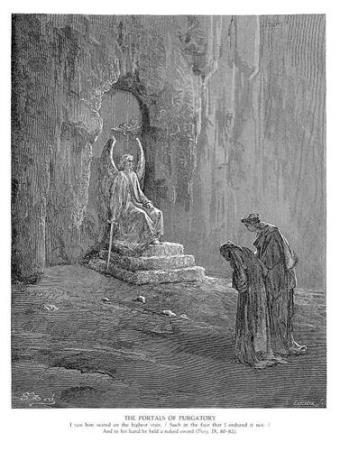ORGANIC FRUIT
The Doctrine of Purgatory
By Stephanie Ismer

The Bible teaches that Jesus' sacrifice was sufficient payment for our sin debt. In other words, He paid the penalty for our sins, PAST, PRESENT, and FUTURE — IN FULL ("When Jesus therefore had received the vinegar, he said, It is finished: and he bowed his head, and gave up the ghost." John 19:30). Hebrews 10:10 states: "By this will we have been sanctified through the offering of the body of Jesus Christ once [for all]."To the contrary, the Roman Catholic Church teaches the doctrine of Purgatory, which is a direct denial of the sufficiency of His sacrifice. Purgatory, as defined in THE CATECHISM OF THE CATHOLIC CHURCH, copyright 1997, page 291, article 1030-1032, as follows: "1030: All who died in God's grace and friendship, but still imperfectly purified, are indeed assured of their eternal salvation; but after death they undergo purification, so as to achieve the holiness necessary to enter the joy of heaven." This heretical teaching was formulated at the Councils of Florence and Trent, and encourages the practice of praying for the dead, which is also in direct contradiction to biblical truths.
Scripture is very clear that Jesus' sacrifice was sufficient; that nothing else is necessary to pay the debt we all owe for our sin, yet cannot pay ourselves, according to Hebrews 10:10: "By this will we have been sanctified through the offering of the body of Jesus Christ once for all." Also, 1 Peter 3:18 speaks to the sufficiency of Christ's sacrifice: "For Christ also died for sins once for all, [the] just for [the] unjust, so that He might bring us to God, having been put to death in the flesh, but made alive in the spirit." The question remains regarding the belief in Purgatory, if man were able to pay even a part of their own sin debt, then why would they need a Saviour — a substitute? To believe this is to believe that a fallen, sinful human being is capable of earning entry into heaven on the basis of his/her works, and that is totally contrary to the teachings of Scripture.
Taken from the Catholic website, www.catholic.com, under the heading "Roots of Purgatory":
All Christians agree that we won't be sinning in heaven. Sin and final glorification are utterly incompatible. Therefore, between the sinfulness of this life and the glories of heaven, we must be made pure. Between death and glory there is a purification.This is in direct contradiction to many passages of Scripture, such as 1 John 1:7: "but if we walk in the Light as He Himself is in the Light, we have fellowship with one another, and the blood of Jesus His Son cleanses us from all sin." His blood cleanses those who believe from how much sin? ALL SIN; therefore there is no further cleansing (or purification) needed.
Thus, the Catechism of the Catholic Church states: "All who die in God's grace and friendship, but still imperfectly purified, are indeed assured of their eternal salvation; but after death they undergo purification, so as to achieve the holiness necessary to enter the joy of heaven. The Church gives the name purgatory to this final purification of the elect, which is entirely different from the punishment of the damned" (Catechism of the Catholic Church, articles #1030–1).
The Catholic Church's teaching on Purgatory is also a direct contradiction of what God has written in the Bible. The Catechism of the Catholic Church defines this doctrine as follows:
Those who die in God's grace but are not yet perfectly purified are guaranteed eternal salvation. They undergo purification after death to gain the holiness needed to enter heaven.The question is, if man was able to pay any part of his sin debt ("make purification"), then why would Jesus have had to come in the flesh, suffer, die, be buried, and raised from the dead?"
This "Purgatory" (Councils of Florence and Trent) is totally different from the punishment of the damned. It is a cleansing fire. "The person will be saved, but only through fire" (1 Cor 3:15). "As for certain lesser faults, there is a purifying fire" (Pope St. Gregory the Great).
The Church has always prayed for the dead and offered Mass for them. Judas Maccabees "made atonement for the dead that they might be freed from their sins" (1 Macc 12:46). "Let us not hesitate to help those who have died and to offer our prayers for them" (St. John Chrysostom)." This teaching completely denies the sufficiency of Jesus' sacrifice as payment for the penalty of sin — past, present, and future, as written in Hebrews 7:26-27: "For it was fitting for us to have such a high priest, holy, innocent, undefiled, separated from sinners and exalted above the heavens; who does not need daily, like those high priests, to offer up sacrifices, first for His own sins and then for the {sins} of the people, because this He did once for all when He offered up Himself." 1 Peter 3:18 also addresses the sufficiency of Christ's sacrifice: "For Christ also died for sins once for all, {the} just for {the} unjust, so that He might bring us to God, having been put to death in the flesh, but made alive in the spirit.
Great question.
Image Credit: Gustave Dore; "The Portals of Purgatory"; Public Domain
Tags: Biblical-Truth | Controversial-Issues | False-Teaching | Other-Religions
comments powered by Disqus
Published 7-11-11; Revised on 1-26-15

